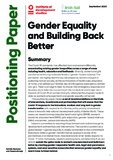Gender Equality and Building Back Better
| dc.contributor.author | Nazneen, Sohela | |
| dc.contributor.author | Araujo, Susana | |
| dc.coverage.spatial | Ireland | en |
| dc.date.accessioned | 2020-10-01T10:08:04Z | |
| dc.date.available | 2020-10-01T10:08:04Z | |
| dc.date.issued | 2020-09-30 | |
| dc.identifier.citation | Nazneen, S. and Araujo, S. (2020) Gender Equality and Building Back Better, Positioning Paper, Brighton: Institute of Development Studies | en |
| dc.identifier.isbn | 978-1-78118-674-9 | |
| dc.identifier.uri | https://opendocs.ids.ac.uk/opendocs/handle/20.500.12413/15675 | |
| dc.description.abstract | The Covid-19 pandemic has affected men and women differently, exacerbating existing gender inequalities across a range of areas including health, education and livelihoods. Globally, women and girls are also experiencing increased levels of gender-based violence. The pandemic has highlighted the key role played by women and girls in sustaining human society, as the continuation of health care, education at home, and wellbeing of families rely on the agency exercised by women and girls. There is an urgent need to ensure that emergency response and recovery plans take into account both the immediate and longer-term impacts of Covid-19 on women and girls, otherwise the progress made to date on women’s empowerment and gender equality will be lost. This positioning paper makes a set of recommendations on the kinds of interventions, investments and partnerships that will ensure that the Covid-19 response in the immediate, medium and long term is gender transformative with respect to the five key policy priority commitment areas in Ireland’s international development policy, A Better World. These areas are: sexual and reproductive health and rights (SRHR); women’s economic empowerment (WEE); girls’ education; gender-based violence (GBV); and women, peace and security (WPS). | en |
| dc.description.sponsorship | Irish Aid, Government of Ireland | en |
| dc.language.iso | en | en |
| dc.publisher | Institute of Development Studies | en |
| dc.rights | This is an Open Access paper distributed under the terms of the Creative Commons Attribution Non Commercial 4.0 International licence (CC BY-NC), which permits use, distribution and reproduction in any medium, provided the original authors and source are credited, any modifications or adaptations are indicated, and the work is not used for commercial purposes. | en |
| dc.rights.uri | http://creativecommons.org/licenses/by-nc/4.0/ | en |
| dc.subject | Development Policy | en |
| dc.subject | Gender | en |
| dc.subject | Health | en |
| dc.title | Gender Equality and Building Back Better | en |
| dc.rights.holder | Institute of Development Studies | en |
| dc.identifier.team | Rural Futures | en |
| rioxxterms.funder | Default funder | en |
| rioxxterms.identifier.project | Default project | en |
| rioxxterms.version | VoR | en |
| rioxxterms.funder.project | 9ce4e4dc-26e9-4d78-96e9-15e4dcac0642 | en |
Files in this item
This item appears in the following Collection(s)
Except where otherwise noted, this item's license is described as This is an Open Access paper distributed under the terms of the Creative Commons Attribution Non Commercial 4.0 International licence (CC BY-NC), which permits use, distribution and reproduction in any medium, provided the original authors and source are
credited, any modifications or adaptations are indicated, and the work is not used for commercial purposes.


